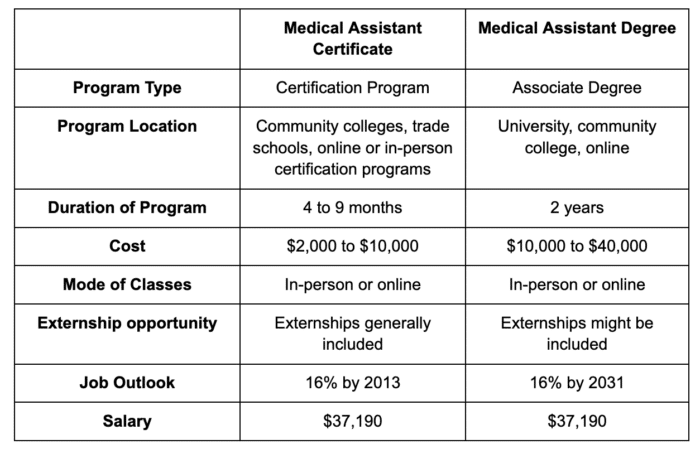If you wish to enter the healthcare industry without having to attend years of schooling, medical assistance might be the best career choice for you.
According to the U.S. Bureau of Labor Statistics, the job growth for medical assistants is also expected to rise by 16%, which makes it an ideal career to step foot into.
Medical Assistants are healthcare workers who provide support services to nurses, physicians, and other healthcare professionals. Their roles and responsibilities generally entail both administrative and clinical tasks, ranging from assisting physicians with bedside procedures to scheduling appointments.
The best part about pursuing a career in medical assistance is that you don’t need a degree to enter the workforce. The minimum prerequisite is for you to complete your high school diploma or a GED.
Even though a degree is not required for medical assistants, employers highly prefer candidates who are certified.
If you’re interested in pursuing this career, you might be wondering now if you should go for a degree or a certificate.
Let us explore the differences between the two so that you can decide which suits you best.
Also see: 12 Reasons to Become a Medical Assistant
Medical Assistant Certificate vs. Degree: An Overview
Almost all states across the country, except Washington, do not require medical assistants to be licensed or certified. As mentioned earlier, the only requirement for aspiring medical assistants who want to start their careers in this field is to complete their high school diploma or a GED.
See: Are Medical Assistant Licenses Required?
Enrolling in a degree program also has one major disadvantage: extremely high costs.
Let us take a look at a brief overview of medical assistants’ degrees vs. certificates-
Read more: How to Become a Medical Assistant
What are Medical Assistant Degrees?
Medical Assistant degrees are generally associate degrees that include medical assisting courses in addition to general education courses.
The typical topics covered within associate degrees are pharmacology, clinical procedures, anatomy and physiology, medical administration, and medical terminologies.
Obtaining a medical assistant (associate) degree prepares you for the same exam that you would take if you chose a certification program.
The biggest disadvantage that a degree holds is that it is highly expensive, around $10,000 to $40,000. This might become a burden for students as they will need to eventually take an education loan.
See: Accelerated Medical Assistant Program
Associate degrees for medical assistants are generally offered by community colleges or technical universities. Another disadvantage is the duration of the program since an associate degree takes a minimum of 2 years to complete.
Medical assistant degrees prepare you for the same jobs that you will get with certification programs as well. There are chances that you might get a slightly higher salary with a degree, but earning your certification or license in any way should be your priority.
Also read: Medical Assistant Job Duties
What are Medical Assistant Certificates?
Earning a medical assistant certification helps you train as a medical assistant and gain the right knowledge and skill set you would need to care for patients.
Even though there are many types of certificates, the most common and legitimate ones are the CCMA, CMA, and RMA certifications. These certifications might have slightly different requirements, however, they are regarded as equal by the employers.
Medical assistant certification programs focus only on courses related to medical assistance, which means you will not have to study any general educational courses, which is usually the case in associate degrees.
Also see: Medical Assistant Educational Requirements
These programs are typically offered by community colleges or online programs and can be completed in as little as 4 to 9 months, depending on the program and your pace.
The biggest advantage that certification programs offer, as compared to degree programs, is that they are highly affordable. You can expect your tuition fees to be around $2,000 to $10,000, which also relieves you from undertaking student loans.
After completion of your certificate program, you will be eligible to sit for the certification exam of your choice.
Getting certified as a medical assistant makes you more employable than an uncertified one. Certified medical assistants also earn around 10% more than uncertified medical assistants.
See more: Cheapest Medical Assistant Program
Medical Assistant Degrees and Certificates: Comparison
As mentioned earlier, both medical assistant degrees and certification programs lead to similar outcomes in terms of job opportunities and skill development.
However, there are some differences between the two, let us see how they differ:
- Medical Assistant Job Outlook-
Associate degrees usually offer a 60-credit program, which takes 2 years to complete, if you decide to pursue the degree full-time. Other options are self-paced, but if you choose to pursue a part-time degree, it can also take you up to 4 years to complete. Certification programs, on the other hand, can be generally completed in as little as 4 months, although usually, they take up to 4 to 9 months. Most of these programs can be completed online. - Cost of Program-
The cost of degree programs usually depends on the type of university you choose. If you choose a university that requires you to move out of your state, it might cost you thousands of dollars in terms of tuition fees, moving costs, and the general cost of living. However, if you choose a local college, you can expect it to be much more affordable, with degree programs costing around $10,000.In comparison, certificate programs are the cheapest alternative to getting certified as a medical assistant. These programs can cost anywhere from $2,000 to $10,000.
- Perception of employers-
Generally, employers do not list medical assistant degrees on the list of requirements while listing job opportunities. Degrees are, however, known to make you look more competitive as compared to a certificate. When it comes to salary, both degree and certificate holders are paid the same amount, as long as they are both certified.
Also read: Certified Medical Assistant Salary
- Externship availability degree and certification programs that are accredited typically include externship hours and opportunities. Medical assistant externship programs are usually similar for both degree and certification programs.See more on: Medical Assistant Externship
- Externships are important for aspiring medical assistants as they provide you with hands-on industry experience and also allow you to put your knowledge and skills to use. Externships usually involve aspiring medical assistants working with their seniors in a workplace setting.
Also read: Medical Assistant Skills
- Extra educational classes- Degree courses are significantly longer than certification courses due to the additional courses that are included in their curriculum. Associate degree programs generally include courses such as basic math, social sciences, and English. Certificate programs focus only on medical assisting courses, and you can start with these programs right after you complete your high school diploma or a GED.
See also: How Long Does it Take to Become a Medical Assistant
- Job Opportunities- As mentioned earlier, job opportunities are generally similar for both medical assistant certificate and degree holders. Common work locations for medical assistants include clinics, doctor’s offices, and outpatient care centers.
There are also many types of medical assistants who choose to specialize in specific areas, such as:-
- Cardiology medical assistant
- Dermatology medical assistant
- OB/GYN medical assistant
- Pediatric medical asssitant
- Podiatric medical assistant
- Military medical assistant
- Ophthalmic medical assistant
Also read: Where Can Medical Assistants Work
Some medical assistants also choose to incline majorly toward either the clinical or administrative side of tasks.
According to the U.S. Bureau of Labor Statistics, the job outlook for medical assistants looks fairly positive. The expected job growth for medical assistants is around 16% by the year 2031, which makes it significantly higher than other professions.
The national average salary for medical assistants was also reported to be $37,190 or $17.88 per hour.
Also see: Which Medical Assistant Certificate is Best?

Do You Want To Become a Medical Assistant? Check Out Free Medical Assistant Masterclass!
In our masterclass you learn:
- How to be a medical assistant faster…in just 4 months!
- Avoid student debt & driving to classes
- #1 thing employers want from Medical Assistants
- How to stand-apart & get a university certificate for a strong resume
What is Better: a Medical Assistant Degree or a Certificate?
When deciding on the type of medical assistant education that suits you best, it is important to consider factors such as cost, program duration, and the credentials obtained.
While most employers do not necessarily require degrees, most prefer to hire medical assistants with higher education.
If you wish to pursue further education within the medical assistant field and want a more advanced degree, an associate degree might be a suitable choice. However, it is essential to also carefully examine the transferability of credits associated with the program.
Also read: Is Medical Assistant Degree Required?
It’s also important to note that there are currently no bridge programs available for transitioning from medical assisting to other healthcare professions.
So you may find yourself repeating similar courses or potentially extending the duration of your advanced healthcare degree by several years.
Also read: Medical Assistant Program
Conclusion
Choosing between a medical assistant degree or certificate involves considering your career goals and the depth of education you prefer. A degree might offer a broader understanding of healthcare, taking longer to complete but potentially opening doors to higher positions.
On the other hand, a certificate program might be quicker and more focused on practical skills for immediate entry into the workforce. Both paths have their merits, so the choice ultimately hinges on your aspirations and how you prefer to learn and grow in the field of medical assisting.
Related Resources:
- Certified Clinical Medical Assistant
- CMA vs CNA
- CCMA vs CMAA
- How to get Medical Assistant jobs with no experience
- Medical Assistant Interview Questions
- Medical Assistant On-the-Job Training
- Medical Assistant Program Cost
- Is Medical Assistant a Good Career?
- National Certified Medical Assistant NCMA
- 4 Week Medical Assistant Program
- Become a Medical Assistant in 6 weeks
Related Articles
-
How to Be Successful in College in 2022 – 7 Simple Tips to Succeed
-
How Do Scholarships Work? Read This First…Truth is Shocking
-
7 Best College Majors 2024: What Should I Major In?
-
How to Choose a College – 10 Things You Must Consider in 2024
-
Why Go to College? Top 13 Benefits for Adult Students in 2022
-
Top 5 Best Alternatives to Community College for 2024











